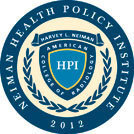by
Loren Bonner, DOTmed News Online Editor | January 08, 2013
Researchers at the Harvey L. Neiman Health Policy Institute, a new American College of Radiology think tank, found that while radiologists were more likely to meet Medicare Physician Quality Reporting System (PQRS) requirements, they could still face penalties totaling more than $100 million in the very near future.
PQRS was established in 2007 as a program to incentivize physicians with bonuses when they successfully met very specific documentation and reporting requirements.
According to the study, only a minority of radiologists successfully qualified for incentives under PQRS, but that number has increased each year, and as a whole, radiology did better than other specialties.
But like many programs that health care reform has turned into outcome-driven, value-based purchasing arrangements, PQRS will transition from giving physicians bonuses to instituting penalties for those who don't meet the requirements.
"Because it's physician reporting behavior in 2013 that will be used as the basis for penalties in 2015, we now have about 365 days to get our collective act together so that we — physicians in general — won't be subject to widespread government penalties," Dr. Richard Duszak, chief executive officer and senior research fellow of the Harvey L. Neiman Health Policy Institute, told DOTmed News.
Researchers analyzed 2007-2010 PQRS program data and found that the number of PQRS eligible, participating and incentive-qualifying radiologists increased each year and that nearly 24 percent of eligible radiologists qualified for PQRS incentives in 2010, compared to 16 percent for other providers.
Duszak said that this could be attributed to a few things that radiologists have been focused on over the past few years. For one, radiology professional societies — like ACR — have made a concerted effort to educate members about the PQRS program, developing specific criteria for radiologists to follow and communicating that information to members effectively.
"This isn't rocket science. It's just making sure specific phraseology goes into the chart. This requires physicians to realize that this is important and then seek the education," said Duszak.
He also recommends that physicians work with their practices to develop mechanisms so that the information is transmitted correctly to the agency.
"If doctors don't have coders that are capturing and transmitting [the information] appropriately to CMS, it's the proverbial tree falling in the woods," he said.
Duszak also thinks radiology, being a digital-based specialty, has been advantageous to other practices that are still paper-based.
The study also found that registry reporting versus claims-based reporting more frequently resulted in incentive payments from CMS for physicians.
